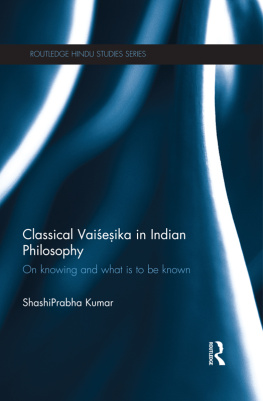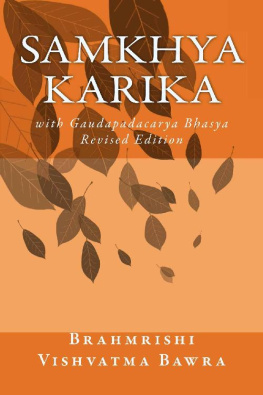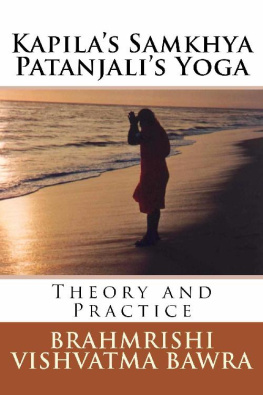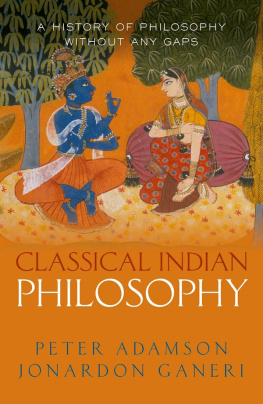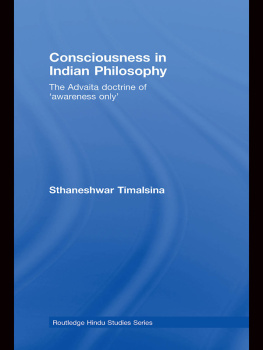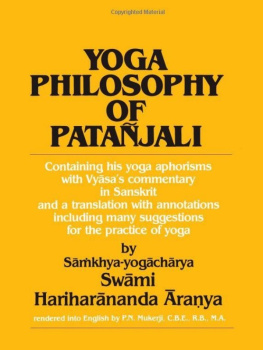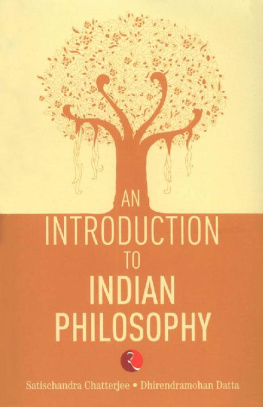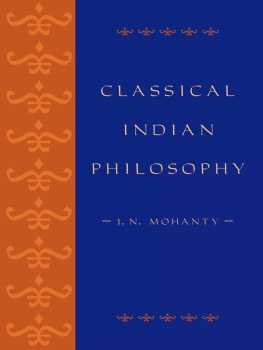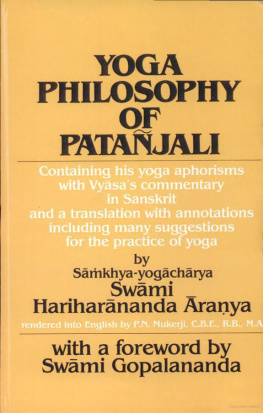THE
SNKHYA APHORISMS
OF
KAPILA,
WITH
Illustrative Extracts from the Commentaries.
TRANSLATED BY
JAMES R. BALLANTYNE, LL. D.,
LATE PRINCIPAL OF THE BENARES COLLEGE.
THIRD EDITION.
LONDON:
TRBNER & CO., LUDGATE HILL.
1885.
{reduced to HTML and edited by Christopher M. Weimer, January 2003}
p. i
ADVERTISEMENT.
THE present work, both in its Sanskrit portion and in its English, is an amended reprint of three volumes,appeared, contains nothing of the Sanskrit original but the Aphorisms.
While, in the following pages, all the corrections obtainable from the abridgment have been turned to account, an immense number of improved readings have been taken from another source. Three several times I carefully read Dr. Ballantyne's translation in as many different copies of it; entering suggestions, in the second copy, without reference to those which had been entered in the first, and similarly making independent suggestions in my third copy. All these as successively introduced. The renderings proposed in the footnotes are, for the most part, from among those which have recently occurred to me as eligible.
That Dr. Ballantyne had any thought of reissuing, in whatever form, the volumes mentioned at the beginning of this Advertisement, I was unaware, till some years after he had made over the abridgment of them to Professor Cowell, for publication. Otherwise, I should have placed at his disposal the materials towards improvement of his second edition, which, at the cost of no slight drudgery, are here made available.
The Snkhya Aphorisms, in all the known commentaries on them, are exhibited word for word. The variants, now given, of the Aphorisms, afforded by accessible productions of that character, have been drawn from the works, of which only one has yet been printed, about to be specified:
I. The Snkhya-pravachana-bhshya, by Vijnna Bhikshu. Revelant particulars I have given elsewhere. My oldest MS. of it was transcribed in 1654.
p. vi
II. The Kpila-snkhya-pravachana-stra-vitti, by Aniruddha. Of this I have consulted, besides a MS. copied in 1818, formerly the property of Dr. Ballantyne, one which I procured to be copied, in 1855, from an old MS. without date.
III. The Laghhu-snkhya-stra-vitti, by Nagesa. Of this I have two MSS., both undated. One of them is entire; but the other is defective by the three first Books.
IV. The Snkhya-pravachana-stra-vitti-sra, by Vednti Mahdeva. Here, again, only one of two MSS. which I possess is complete. The other, which breaks off in the midst of the comment on Book II., Aph. 15, is, in places, freely intetpolated from No. I. Neither of them has a date.
Nearly all my longer annotations, and some of the shorter, were scrutinized, while in the rough, by the learned Professor Cowell, but for whose searching criticisms, which cannot be valued too highly, they would, in several instances, have been far less accurate than they now are.
F. H.
MARLESFORD, SUFFOLK,
Aug. 28, 1884.
Footnotes
p. iii
Their titles here follow:
"The Aphorisms of the Snkhya Philosophy of Kapila, with Illustrative Extracts from the Commentaries. [Book I.] Printed for the use of the Benares College, by order of Govt. N. W. P. Allahabad: Printed at the Presbyterian Mission Press. Rev. L. G. HAY, Sup't. 1852."
"The Aphorisms of the Snkhya Philosophy, by Kapila, with Illustrative Extracts from the Commentary. Books II., III., & IV. In Sanskrit and English, Printed for the use of the Benares College, by order of Govt. N. W. P. (1st Edition, 550 Copies: Price 12 annas.) Allahabad: Printed at the Presbyterian Mission Press. Rev. L. G. HAY, Superintendent. 1854."
"The Aphorisms of the Snkhya Philosophy, by Kapila, with Illustrative Extracts from the Commentary by Vijnna-Bhikshu. Books V. & VI. Sanskrit and English. Translated by James R. Ballantyne, LL.D., Principal of the Govt. College, Benares. Printed for the use of the Benares College, by order of Govt. N. W. P . (1st Edition, 550 Copies:Price 12 annas.) Allahabad: Printed at the Presbyterian Mission Press. Rev. L. G. HAY, Sup't. 1856."
Occupying Fasciculi 32 and 81 of the New Series of the Bibliotheca Indica, issued in 1862 and 1865. The proof-sheets of only 32 pages of the whole, from the beginning, were read by Dr. Ballantyne; the rest, by Professor Cowell.
The title of the abridged form runs: "The Snkhya Aphorisms of Kapila, with Extracts from Vijnna Bhiks[h]u's Commentary," &c. But this is a misrepresentation, as regards Book I., which takes up 63 pages out of the total of 175. The expository matter in that Book is derived, very largely, from other commentators than Vijnna. p. iv Vednti Mahdeva mainly supplies it at the outset, and, towards the end, well nigh exclusively, Aniruddha. Some share of it, however, will not be traced; it having been furnished by one of Dr. Ballantyne's pandits, whom I have repeatedly seen in the very act, as by his own acknowledgment, of preparing his elucidations.
Many of them, especially in Books II.-VI., rest on readings of the original preferable to those which had been accepted.
Though not fully published till 1856, my edition of the Snkkya-pravachana-bhshya, its preface alone excepted, was in print as early as 1853; and Dr. Ballantyne had a copy of it. A few arbitrarily chosen words apart, his text, after Book I., is borrowed from it throughout, but with no mention of the fact. My advice was unheeded, that he should profit by the copious emendations which I had amassed and digested from better manuscripts than those to which I at first had access. Greatly to his disservice, he would not be induced even to look at them. It faring the same with my typographical corrections, he has, here and there, reproduced errors, more or less gross, which might easily have been avoided. See, for specimens. pp. 197, 288, 357, 373, 374, 381, 390.
p. v
Nor has attention been topically directed to sundry blemishes of idiom which have been removed; as, for example, by the substitution of 'unless' for 'without,' of 'in time' for 'through time,' of 'presently' for 'just,' and of 'between the two' for 'between both.'
"At the time of his departure from India, in 1860, Dr. Ballantyne left with me the MS. of his revised translation of the Snkhya Aphorisms," "Notice," in the Bibliotheca Indica, New Series, No, 81.
For details respecting these commentaries and their authors, see my Contribution towards an Index to the Bibliography of the Indian Philosophical Systems, or my Preface to the Snkhya-sra.
p. vi
I once had a second copy of this very rare work, bearing no date, but most venerable in appearance. Like many of my manuscript treasures, it was lent, and never found its way back to me.
PREFACE.
THE great body of Hindu Philosophy is based upon six sets of very concise Aphorisms. Without a commentary, the Aphorisms are scarcely intelligible; they being designed, not so much to communicate the doctrine of the particular school, as to aid, by the briefest possible suggestions, the memory of him to whom the doctrine shall have been already communicated. To this end they are admirably adapted; and, this being their end, the obscurity which must needs attach to them, in the eyes of the uninstructed, is not chargeable upon them as a fault.
For various reasons it is desirable that there should be an accurate translation of the Aphorisms, with so much of gloss as may be required to render them intelligible. A class of pandits in the Benares Sanskrit College having been induced to learn English, it is contemplated that a version of the Aphorisms, brought out in successive portions, shall be submitted to the criticism of these men, and, through them, of other learned Brhmans, so that any errors in the version may have the best chance of being discovered and rectified. The employment of such a version as a class-book is designed to subserve, further, the attempt to determine accurately the aspect of the philosophical terminology of the East, as regards that of the West.
Next page

